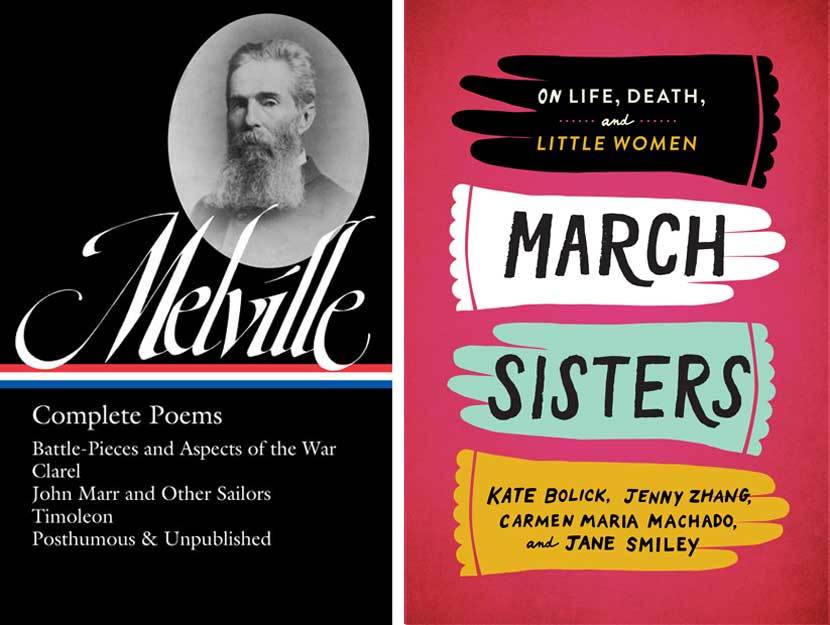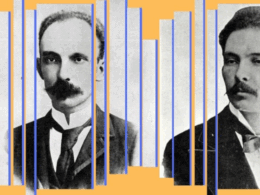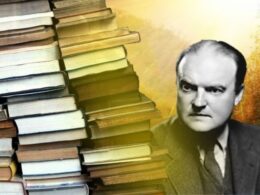
Library of America is excited to offer an especially wide-ranging slate of titles for the second half of 2019.
In the black-jacketed Library of America series, we cap our four-volume Herman Melville edition, begun thirty-seven years ago with series volume #1, with volume #320, gathering his complete poetry. A two-volume set captures an era of explosive creative ferment in American science fiction. We expand our shelf of titles for younger readers with a deluxe edition of Frances Hodgson Burnett’s classic works. And we launch editions of two major new writers in the series, Jean Stafford, with a volume presenting her complete novels, and Joan Didion, who becomes just the third currently living writer featured in the series.
LOA’s special publications next fall are no less varied. Nancy Hale, a neglected virtuoso of the short story, receives her due in a new edition selected by Lauren Groff, and Harold Bloom, our preeminent literary critic, returns in a magisterial summing-up of his lifelong engagement with American literature assembled by David Mikics. Meanwhile, leading contemporary writers reflect on Louisa May Alcott’s Little Women and on Charles Schulz’s immortal comic strip Peanuts.
Browse the list below for information about contents and publication dates, and scroll further down for a more detailed description of each new title.
LIBRARY OF AMERICA SERIES
Herman Melville
Complete Poems
Hershel Parker, editor
Battle-Pieces and Aspects of the War • Clarel • John Marr and Other Sailors • Timoleon • Posthumous & Unpublished
Library of America #320 / ISBN 978-159853-618-8
August 2019
American Science Fiction: Eight Classic Novels of the 1960s (two volumes)
Gary K. Wolfe, editor
Volume 1: Four Classic Novels 1960–1966
Poul Anderson, The High Crusade • Clifford D. Simak, Way Station • Daniel Keyes, Flowers for Algernon • Roger Zelazny, . . . And Call Me Conrad [This Immortal]
Library of America #321 / ISBN 978-159853-501-3
Volume 2: Four Classic Novels 1968–1969
R. A. Lafferty, Past Master • Joanna Russ, Picnic on Paradise • Samuel R. Delany, Nova • Jack Vance, Emphyrio
Library of America #322 / ISBN 978-159853-502-0
Boxed set: ISBN 978-159853-635-5
September 2019
Frances Hodgson Burnett
The Secret Garden, A Little Princess, Little Lord Fauntleroy
Gretchen Holbrook Gerzina, editor
Library of America #323 / ISBN 978-159853-638-6
September 2019
Jean Stafford
Complete Novels
Kathryn Davis, editor
Boston Adventure • The Mountain Lion • The Catherine Wheel
Library of America #324 / ISBN 978-159853-644-7
November 2019
Joan Didion
The 1960s & 70s
David Ulin, editor
Run, River • Slouching Towards Bethlehem • Play It As It Lays • A Book of Common Prayer • The White Album
Library of America #325 / ISBN 978-159853-645-4
November 2019
SPECIAL PUBLICATIONS
March Sisters: On Life, Death, and Little Women
By Kate Bolick, Jenny Zhang, Carmen Maria Machado, and Jane Smiley
ISBN 978-159853-628-7
August 2019
The Peanuts Papers: Charlie Brown, Snoopy & the Gang, and the Meaning of Life
Andrew Blauner, editor
ISBN 978-159853-616-4
September 2019
Where the Light Falls: Selected Stories of Nancy Hale
Edited and introduced by Lauren Groff
ISBN 978-159853-642-3
October 2019
Harold Bloom
The American Canon: Literary Genius from Emerson to Pynchon
David Mikics, editor
ISBN 978-159853-640-9
October 2019
While Herman Melville is best known today for his stories and novels, the author of Moby-Dick nonetheless devoted much of his creative life to writing poetry—and ranks with Whitman and Dickinson as one of America’s greatest nineteenth-century poets. Released to mark the author’s bicentennial in 2019, Herman Melville: The Complete Poems brings together for the first time all of his poetry within the covers of a single volume. His first book of poetry, Battle-Pieces and Aspects of the War (1866), is both a moving work of mourning (Melville dedicated it to the Union dead) and a fascinating record of events, tracking campaigns and battles and the war’s immediate aftermath. Likened to Paradise Lost and The Waste Land, the long narrative poem Clarel (1876), which recounts an American divinity student’s trip to the Holy Land, has come to be appreciated as a profound exploration of the problem of belief and a unique window into Melville’s deepest concerns. The two privately issued late books John Marr and Other Sailors (1888) and Timoleon (1891) contain some of Melville’s finest lyric verse. Finally, rounding out the volume are the extraordinary poems from his two unfinished manuscripts, Weeds and Wildings and Parthenope, along with miscellaneous uncollected poems. Made possible by recent advances in scholarship—all of the poems are presented in the authoritative Northwestern-Newberry texts—Complete Poems will for the first time allow readers to appreciate for themselves the extraordinary range of Melville’s poetic achievement.
The tumultuous 1960s was a watershed decade for American science fiction. As the nation raced to the moon, acknowledged masters from the genre’s “golden age” reached the height of their powers. As it confronted calls for civil rights and countercultural revolution, a “new wave” of brilliant young voices emerged, upending the genre’s “pulp” conventions with newfound literary sophistication—and female, queer, and nonwhite authors broke into the ranks of SF writers, introducing provocative new protagonists and themes. In American Science Fiction: Eight Classic Novels of the 1960s, editor Gary K. Wolfe gathers eight wildly inventive novels in a deluxe, two-volume collector’s set: Daniel Keyes’s heartbreaking Flowers for Algernon and Poul Anderson’s madcap novel set in medieval England and on the planet Tharixan, The High Crusade; Clifford D. Simak’s Hugo Award-winning Way Station; Roger Zelazny’s Hugo Award–winning . . . And Call Me Conrad (published in book form as This Immortal), restored to a version that most closely approximates Zelazny’s original text; Joanna Russ’s Picnic on Paradise, a pioneering work of feminist SF, and Samuel R. Delany’s proto-cyberpunk space opera Nova; R. A. Lafferty’s quirky, neglected, utterly original Past Master; and Jack Vance’s haunting Emphyrio. Wolfe’s introduction offers a new view of the genre’s best, and a discussion of his selections, that ought to provoke rethinking and debate among fans and critics. (Wolfe’s new collection is a successor to American Science Fiction: Nine Classic Novels of the 1950s, the two-volume set he edited for us in 2012.)
Born in England, Frances Hodgson Burnett (1849‒1924) lived much of her life in the United States, crafting unforgettable novels that capture the magic and wonder of childhood. Now, following on recent editions of Laura Ingalls Wilder’s Little House books and Madeleine L’Engle’s Kairos Novels, LOA presents Frances Hodgson Burnett: The Secret Garden, A Little Princess, Little Lord Fauntleroy, which brings together Burnett’s most iconic works along with three short pieces that illuminate her inspirations for each book. This deluxe edition, which restores all the original illustrations (including sixteen in color) by Reginald B. Birch, Ethel Franklin Betts, and Maria Louise Kirk, is a lovingly produced keepsake that belongs in every family library.
Jean Stafford (1915–1979) made a bold entrance onto the American literary scene in 1944 when her first novel, Boston Adventure, became a surprise best-seller. She followed up her initial success with two more acclaimed novels, The Mountain Lion (1947) and The Catherine Wheel (1952), and became a prolific writer of short stories for The New Yorker and other prominent magazines. (Her Collected Stories won the Pulitzer Prize for Fiction in 1970.) Jean Stafford: Complete Novels allows readers to rediscover this twentieth-century master by making available in a single hardcover volume all three of her novels, which are set in vividly captured milieus ranging from Boston high society to suburban Los Angeles and from backcountry Colorado to a country house in Maine. (A companion volume of Stafford’s complete stories is in development.)
Joan Didion: The 1960s & 70s inaugurates a multi-volume edition of the iconic writer’s fiction and nonfiction with a collection of her five classics from the decades when she exploded on to the literary scene: Run, River, Slouching Towards Bethlehem, Play It As It Lays, A Book of Common Prayer, and The White Album. Whether writing about countercultural San Francisco, the Las Vegas wedding industry, Lucille Miller, Charles Manson, or the shopping mall, Didion achieves a wonderful negative sublimity without condemning her subjects or condescending to her readers. Working in cooperation with the author, editor David Ulin provides notes and a biographical chronology that will enlarge the reader’s experience and appreciation. (Ulin previously edited Writing Los Angeles: A Literary Anthology for Library of America.)
For the 150th anniversary of the publication of Louisa May Alcott’s Little Women, Kate Bolick, Jenny Zhang, Carmen Maria Machado, and Jane Smiley explore their strong lifelong personal engagement with Alcott’s novel—what it has meant to them and why it still matters. Each takes as her subject one of the four March sisters, as a way of approaching the novel more generally and also as a way of reflecting on each particular sister’s story and what it has to teach us about life. Bolick writes about how the novel’s depiction of Meg as the “ideal woman” reveals Alcott’s dim views of marriage and planted seeds in Bolick’s own young mind. Zhang, unlike many readers, considered Jo her least favorite sister as a girl, and writes about how Jo eventually won her heart. Machado brings her science fiction and horror sensibilities to a unique perspective on Beth; and Smiley, who considers Amy the most interesting sister, writes about Amy’s evolution into motherhood from the perspective of her own experience as a young mother.
Charles Schulz’s beloved comic strip Peanuts has given the world a cast of characters for the ages—Charlie Brown, Snoopy, and Lucy among them. In the thirty-two essays collected in The Peanuts Papers, artists and writers ranging from Ann Patchett to Chris Ware consider the deeper truths revealed in the strip, its influence on their lives and on the culture more broadly, and the lessons it can teach us about disappointment, melancholy, and those fleeting moments of warm-puppy happiness. Engaging, surprising, at times funny and always insightful, the contributors reflect on the experience of discovering Peanuts as a child, their identification with its characters and predicaments, and, for the artists in the book, the momentous effects of their encounters with the strip on their own careers. The Peanuts Papers is a varied, entertaining, and poignant gathering of responses to the greatest American comic strip, enabling us to see it anew in fresh and revealing ways.
A prolific writer whose long association with The New Yorker rivaled that of her contemporary John Cheever, Nancy Hale (1908–1988) was considered one of the preeminent short story practitioners of her era—but few readers today are likely to recognize her name. In Where the Light Falls: Selected Stories of Nancy Hale, Lauren Groff (whose 2018 story collection Florida was a finalist for the National Book Award) curates twenty-five of Hale’s best stories, spotlighting a neglected writer whose work seems ahead of its time in its depiction of women and the honesty with which she portrayed the inner lives of her characters. Haunting, vivid, and subversive in the best possible sense, Hale’s stories typically concern women recognizable to all of us but too often missing in fiction—sometimes fragile, often ordinary, and possibly wicked—who navigate their way uncertainly through life. Where the Light Falls will be welcomed as the rediscovery of a major twentieth-century author.
In The American Canon: Literary Genius from Emerson to Pynchon, our foremost literary critic celebrates the pantheon of American writers from Emerson and Whitman to Hurston and Ellison, to Ursula K. Le Guin, Philip Roth, and Thomas Pynchon. In this collection of his most illuminating writings on the American canon—five decades’ worth of essays, occasional pieces, and introductions as well as excerpts from several of his books—Bloom reflects on the surprising ways American writers have influenced each other across more than two centuries. Always a champion of aesthetic power, Bloom tells the story of American literature in terms of artistic struggle against powerful predecessors and the American thirst for selfhood.



